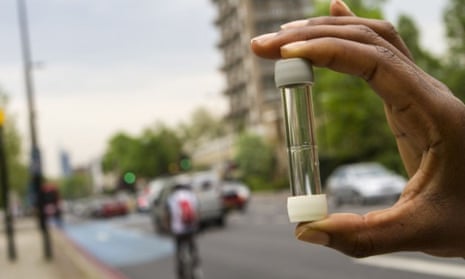A growing number of citizens are monitoring local air quality because of fears official figures are not capturing “dangerous” levels of pollution.
The environmental charity Friends of the Earth has said 70 local groups are now using their testing kits and noted a “surprising” increase in people taking monitoring into their own hands.
Oliver Hayes, a Friends of the Earth air pollution campaigner, said:
“We’ve been surprised by the high demand for our air monitoring kits. 4,000 people have used them in less than a year, uncovering worrying levels of pollution in urban and rural areas alike.
“Most people seem understandably keen to learn about air quality where they live, work, or where their children go to school. But more than 70 local Friends of the Earth groups have used multiple testing kits to uncover a more detailed picture of pollution, often in places lacking much in the way of official monitoring stations.”
Dr Benjamin Barratt, senior lecturer in air quality science at King’s College London, agreed that the numbers doing this had risen.
“Air pollution has moved from being seen as an environmental concern to a health concern but it’s both, of course,” he said. “As a health concern people are more worried about their own families and their neighbourhoods so that has led to a rise in people monitoring air pollution for those reasons.”Barratt says he hopes local work, if done correctly, can help inform decision-making and provide evidence about local situations.
Air Apparent UK, a project in Bristol monitoring local area quality, has been running their work through the Luftdaten website, an open data project that gives advice on how to get monitoring kits and lets people upload their findings online.
Sam Prince, 38, from Bristol said that three UK sites feature on the website at the moment but he has built a further six that will appear soon, and a Leeds resident is also building a monitor that will be added in coming months.
Prince said: “A growing number are doing it … not necessarily in the same way. I know a guy in Bristol who bought a wearable monitor from the US for $200 and that lets him cycle through Bristol on his commute and shows the pollution levels.”
He added: “More people are tracking air quality partly because there is very little local data … You’d think that in a first world country we would be well covered with sensors but there is hardly anything. The air pollution could be good where I am now and 300m down the street it could be bad.”
“The data from the government is useless as far as I am concerned ... so people are trying to collect more evidence to show the big problem of air quality. What I want to build is a map showing the pollution levels all over Bristol so you could avoid a certain street or area, for example, if you were cycling to work.”
Other local groups who have started monitoring air quality include Clean Air Eastbourne in East Sussex and Clean Air Chorley in Lancashire. Residents in Lancing and Shoreham, West Sussex, have also teamed up to explore air pollution levels.
Another concerned group of Catford residents set up their own air monitoring tubes in July 2017 and say the results show “dangerous” levels of pollution.
Ted Burke of Clean Air Catford said they found that the air pollution levels were almost double the legal level in some locations in the area, including next to a number of primary schools.
“We have noted dangerous levels of pollution in some areas. We are now calling on the council to sort it out, want to work with them and know more about what they are doing already,” Burke said.
In Eastbourne, local resident Robert Price said it was finding out that his home town was among the most polluted in the country that got him monitoring air pollution.
“I wanted to get my own data to see if the air was bad where I live. I’ve been running it for a month now, and three of the past seven days alone have breached World Health Organisation guidelines. UK/EU limits for particulate air pollution require a year’s worth of data.”
He added: “Since starting monitoring the air quality where I live, numerous people have been in touch via social media asking how to get involved. I formed Clean Air Eastbourne, and members have contributed to buy another seven sensors to put up around the town.”
Price said that he was motivated by concerns of what air pollution might be doing to his young family and their health. ”We need data to know what the condition of the air we breathe is like … If this data isn’t being tracked, how can we know if there is a problem or not? Building and running our own sensors helps give us this information. This is a matter of vital importance and if the government won’t monitor it properly we must step in.”

Comments (…)
Sign in or create your Guardian account to join the discussion